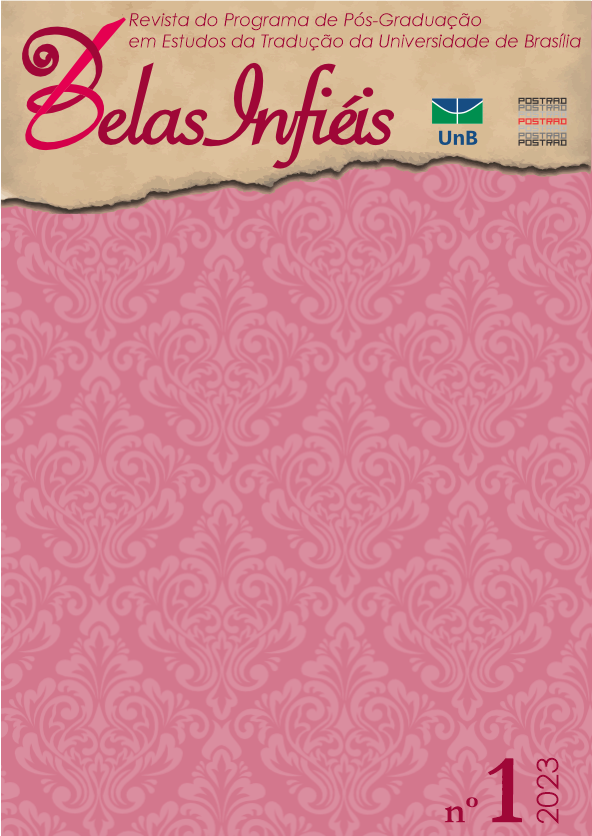“Mãos à obra e aprendei o que é próprio a cada cultura”: Uma nova tradução poética das Geórgicas II de Virgílio
DOI:
https://doi.org/10.26512/belasinfieis.v12.n1.2023.47015Palavras-chave:
Virgílio. Geórgicas. Poesia latina. Tradução poética.Resumo
Virgílio é reconhecido por muitos ainda hoje como um dos maiores poetas de todos os tempos. Contudo, seu reconhecimento deve-se sobretudo à Eneida, bem como às Bucólicas, já que poucas são as pessoas que conhecem sua obra intitulada Geórgicas. Apesar disso, durante uma parte considerável da história da recepção de Virgílio, o valor das Geórgicas foi amplamente reconhecido, contando entre seus admiradores nomes importantes como os de Montaigne, Dryden e Leopardi. Proponho aqui uma breve introdução crítica para quem queira conhecer não apenas esse importante poema virgiliano, mas alguns aspectos fundamentais da cultura romana de modo geral. Encerro a exposição com uma proposta de tradução poética de Geórgicas II para o português contemporâneo, na qual exploro questões apontadas na introdução crítica.
Downloads
Referências
Catão. (2016). Da agricultura (M. Trevizam, tradução, apresentação e notas). Editora da Unicamp.
Dryden, J. (1709). The Works of Virgil. (Obra original publicada em 1697). https://en.wikisource.org/wiki/The_Works_of_Virgil_(Dryden)
Leopardi, G. (1898). Pensieri di varia filosofia e di bella letteratura. Volume I. A cura di Giosuè Carducci. Firenze: Successori Le Monnier.
Marrou, H. I. (1948). Histoire de l’éducation dans l’Antiquité. 2. Le monde romain. Paris : Éditions du Seuil, .
Montaigne, M. (1965). Essais. Livre Second. Édition présentée, établie et annotée par Pierre Michel. Paris: Gallimard.
Plato. (1903). Platonis Opera. Ed. John Burnet. Oxford University Press.
Pound, E. (1951). ABC of Reading. Faber and Faber.
Romero, N. (1948). Prefácio. In Virgílio, Geórgicas. Eneida (A. F. de Castilho, & M. O. Mendes, Trads.) (pp. V–XXVII). W. M. Jackson Inc.
Santos, A. R. P. (2020). Geórgicas bárbaras: Estudo para uma tradução hexamétrica do poema didático virgiliano [Tese de Doutorado, Universidade Federal do Rio de Janeiro]. Rio de Janeiro.
Silva, T. P. B. A. (2010). O II Canto das Geórgicas: O significado das digressões na poesia didática [Dissertação de Mestrado, Universidade Federal do Rio de Janeiro]. Rio de Janeiro.
Trevizam, M. (2014). Poesia didática: Virgílio, Ovídio e Lucrécio. Editora da Unicamp.
Varrão. (2012). Das coisas do campo (M. Trevizam, tradução, introdução e notas). Editora da Unicamp.
Vergil. (1900). Bucolics, Aeneid, and Georgics Of Vergil. J. B. Greenough. Boston: Ginn & Co.
Virgile. (1998). Géorgiques (Texte traduit par Eugène de Saint-Denis). Les Belles Lettres.
Virgílio. (2012). Bucólicas. Geórgicas. Eneida (A. da Silva, Trad.). Círculo de Leitores.
Virgílio. (1948). Geórgicas. Eneida (A. F. de Castilho, & M. O. Mendes, Trads.). W. M. Jackson Inc.
Virgílio. (2019). Geórgicas (P. S. Vasconcellos, Org.; O. Mendes, Trad.). Ateliê Editorial.
Virgílio. (2013). Geórgicas I (M. Trevizam, Org.; A. F. de Castilho, & M. Trevizam, Trads.). Editora UFMG.
Virgílio. (2019). Geórgicas III (M. Trevizam, Org.; A. F. de Castilho, & M. Trevizam, Trads.). Editora UFMG.
Downloads
Publicado
Como Citar
Edição
Seção
Licença
Copyright (c) 2023 CC BY

Este trabalho está licenciado sob uma licença Creative Commons Attribution 4.0 International License.
Dado ao acesso público desta revista, os textos são de uso gratuito, com obrigatoriedade de reconhecimento da autoria original e da publicação inicial nesta revista
A revista permitirá o uso dos trabalhos publicados para fins não comerciais, incluindo direito de enviar o trabalho para bases de dados de acesso público. As contribuições publicadas são de total e exclusiva responsabilidade dos autores.
Os autores, ao submeterem trabalhos para serem avaliados pela revista Belas Infiéis, mantêm os direitos autorais e concedem à revista o direito de primeira publicação, sendo o trabalho licenciado sob a Creative Commons Attribution License Atribuição 4.0 Internacional (CC BY 4.0).



















